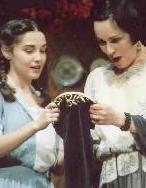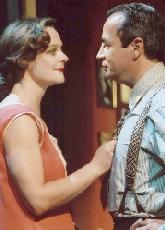SEARCH CurtainUp
REVIEWS
FEATURES
NEWS (Etcetera)
ADDRESS BOOKS
Broadway
Off-Broadway
BOOKS and CDs
OTHER PLACES
Berkshires
London
Los Angeles
Philadelphia
Elsewhere
QUOTES
TKTS
LETTERS TO EDITOR
FILM
LINKS
MISCELLANEOUS
Free Updates
Masthead
NYC Weather
 Berkshire Review
Berkshire ReviewGod of Vengeance
|
I'm not the same man who woke up this morning. God has been invited back into this house --- Jack Chapman explaining his newer, kinder self to the prostitutes from whom he makes his living. |

Ron Liebman as Jack |
Pulitzer playwright Donald Margulies has astutely shifted the time and place to Manhattan's teeming lower East Side of 1923, which coincides with the first English production of the play in New York which ran just long enough for the vice squad to close it down and arrest the performers for their part in "an obscene, indecent, immoral and impure theatrical performance." The New York tenement setting broadens the play's reach to encompass the immigrant experience and the emotional fallout that often came with the desire to assimilate and prosper. This God of Vengeance thus has strong elements of an American Tragedy, or would if it could make Jack Chapman a sufficiently convincing and sympathetic Everyman struggling to regain a lost sense of Godliness.

Laura Breckenridge as Rivkele, Diane Venora as Sara |
Like last season's Street Scene (Our Review), which also had a two-level tenement building and street set, God of Vengeance is visually coherent and effective. It is enriched by some superb performances, notably Diane Venora as the sharp-tongued, eyes wide open wife and mother; Marin Hinkle as Manke, the prostitute who draws Rivkele into the lower depths; and Bruce MacVittie as Shloyme, a younger version of Jack.
Mr. Liebman is encourage to play to the melodramatic elements which he does. However, he is most powerful when he turns down the emotional temperature from a blustery, blistering high -- as in the wordless scene when, with his back to the audience, he examines his daughter's embroidery which one of the four prostitutes has thrown at him. That silent back view is enough to understand the seething tension prompted by this undeniable evidence that his two worlds have collided. Hindle the confrontational prostitute, is another performance standout, with Jennie Bacon , investing the role with the vulnerability and desperation of some of the Tennessee Williams and Eugene O'Neill roles she's played.
Mr. Margulies' adaptation is more successful in its concept than in its translated dialogue which conveys no real flavor of Yiddishkeit. The production generally is more satisfying in its parts than in the overall. The party Jack throws to win back the good will of his neighbors comes off mostly another example of the Festival's ability to give theater goers the sort of spectacle rare on most mondern stages. On the other hand, the Minyan (a ten-man quorum) bringing the Torah to the Chapman's chatchke filled living room, makes for a striking finale to the first act.

Jenny Bacon as Hindl & Bruce MacVittie as Shloyme
|
By greeting the audience entering the theater with the voices of Al Jolson and Eddy Cantor, director Gordon Edelstein immediately establishes a sense of time and place. When the music stops and we enter the dark world where Jack's corruption and yearning for moral and social redemption collide, Edelstein continues to engage our attention. However, in the end, as Jack can't unshackle himself from his ruthlessness, God of Vengeance remains too tightly shackled to its roots to transform Yiddish shtetl melodrama into an American Tragedy.
Now that Mr. Margulies, like so many talented young playwrights, has tried his hand at adapting a play of one of his theatrical forbears, one would hope that he will use his considerable gifts for characters and ideas from his own inventive wellspring.
Other work by Donald Margulies we've reviewed:
Dinner With Friends
Broken Sleep
Collected Stories atr Shakespeare & Co)
Collected Stories at Manhattan Theatre Club
Collected Stories Uta Hagen production
| GOD OF VENGEANCE
by S holom Asch, newly adapted by Donald Margulies from a literal translation by Joachim Neugroschel Director: Godon Edelstein Cast:Ron Leibman/Jack; Diane Venora/Sara, Laura Breckenridge/Rivkele, Marin Hinkle, Manke, Jenny Bacon/Hindl, Bruce MacVittie/Shloyme, Larry Block/Reb Eli, Sol Frieder/The Scribe, Joel Rooks/Orthodox Man, Christy Meyer/Basha, Jenn Lee Harris/Reyzl, Michael Jerrod Moore/Irish Kid, Aaron Patermoster/Kid #2, Rosalind Cramer, Poor Woman #1, Joyce Lazarus/Poor Woman #2, Daniel Deferrati/Indigent #1, Lee Rosen/Indigent #2, Mort Broch/ Prospective In-Law. Poor People, Partygoers and Minyan: Sarah Bellows,Cy Beer, Nancy Burstein, Natalie Jacobson, Robert James, Michael Lively, Constantine Maroulis, Ben Russo, Melissa Miller, Eric Neher, Noam Rubin, Benjuamin Sands, Mark Weimer. Scenic Design: Neil Patel Costumes: Candice Donnelly Lights: Rui Rita Original Music and Sound: John Gromada Running time: 2 hours and five minutes, including one 15-minute intermission Williamstown Theatre Festival, Adams Memorial Theatre, Williams College, Rt. 2, Williamstown,(413) 597-3400. Website Performances: July 31-August 11, 2002 -- 8 p.m. Tuesday through Friday. 8:30 p.m. Saturday. Matinees, 2 p.m. Sunday and Thursday, 4 p.m. Saturday -- $20-$45. Reviewed by Elyse Sommerbased on August 1st performance based |



6,500 Comparative Phrases including 800 Shakespearean Metaphors by CurtainUp's editor.
Click image to buy.
Go here for details and larger image.

